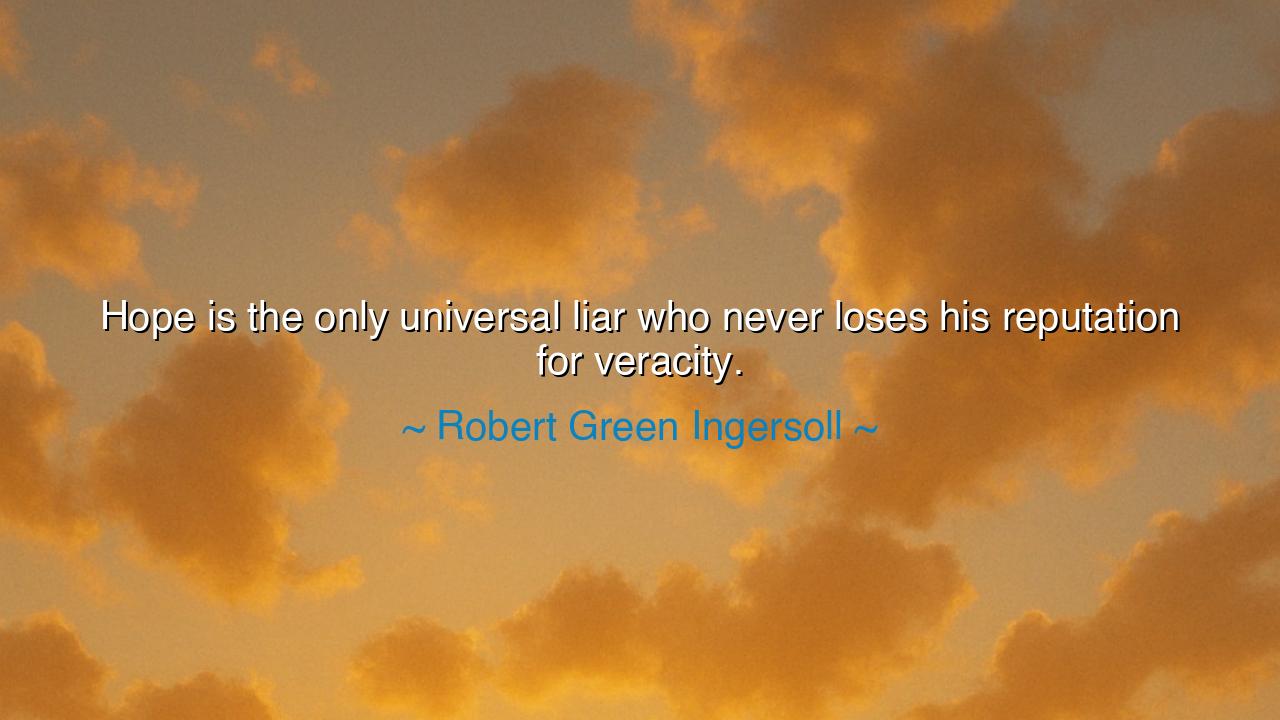
Hope is the only universal liar who never loses his reputation






“Hope is the only universal liar who never loses his reputation for veracity.” — Robert Green Ingersoll
Thus spoke Robert Green Ingersoll, the “Great Agnostic,” a man whose words burned with both skepticism and reverence for human spirit. In this piercing reflection, he captures one of the most paradoxical truths of the soul — that hope, though often deceptive, is the very illusion that sustains life. He calls hope a liar, yet not to condemn it, but to reveal its strange and sacred power: it promises what it cannot always deliver, yet mankind continues to believe in it. Like the rising of the sun after storm and night, hope returns, again and again, and though it may deceive, it also redeems. It is the sweetest of deceptions — the one that keeps us alive.
Ingersoll lived in the nineteenth century, an age of reason and revolution. He was a man who doubted the heavens yet admired the nobility of human courage. He saw empires fall, faiths shaken, and dreams undone. To him, hope was not the light of divine promise, but a natural force, born from the heart’s refusal to surrender. He observed that humanity, though betrayed countless times by its own expectations, continues to hope — for peace after war, for love after loss, for meaning amid chaos. And so he named hope a “universal liar” — one who deceives all people, in all times. Yet in the same breath, he confessed that she “never loses her reputation for truth.” For though her promises fail, her spirit never dies.
There is deep irony in his words. Hope is false, and yet it feels true. It promises victory, and we often meet defeat; it assures us of happiness, and life brings pain. And yet, without her, humanity withers. Hope, then, is the necessary illusion, the divine deceit that keeps the world turning. It whispers to the sick that they may be healed, to the exiled that they will return, to the broken that love still awaits them. Even when proven false, it returns the next day in new form — gentle, persistent, undeterred. Ingersoll saw that man’s greatness lies not in never being deceived, but in continuing to believe, even knowing the risk of heartbreak.
Consider the tale of Ernest Shackleton, the explorer who led his men into the icy desolation of Antarctica in 1914. When their ship, the Endurance, was crushed by the frozen sea, they were left stranded — no shelter, no rescue, no hope of survival. Yet Shackleton refused to surrender. He told his men they would live, even when death seemed certain. For months they endured hunger, frost, and exhaustion, carried only by the hope he inspired. And in the end, miraculously, all survived. The hope that had lied to them — that they would see home again — became truth. In that story lies the secret of Ingersoll’s paradox: though hope may deceive, sometimes it deceives us into courage, and courage turns the lie into a miracle.
Ingersoll’s words also warn us to treat hope with humility. She is a mighty friend, but a dangerous mistress. The wise man hopes, but does not depend blindly; he dreams, but keeps his hands upon the plow. For when hope becomes expectation without effort, she turns cruel — leading men into folly and despair. Yet when she is joined with perseverance, she becomes the mother of all achievement. Every invention, every act of love, every victory of freedom began with a hope that seemed impossible. The heroes of history — from Galileo who defied the stars, to Harriet Tubman who led her people through darkness — lived by this contradiction. Hope told them a lie — that one person could change the world — and they made it truth by believing.
Thus, Ingersoll’s “universal liar” is not an enemy to be shunned, but a companion to be understood. She will sometimes mislead you, yes — but she will never abandon you. She is the flame that flickers even when reason grows cold. When her promises fail, she still leaves behind the strength to try again. And this is her divine secret: hope may not always tell the truth, but it always gives the strength to find it.
So, my children, learn this paradox well: do not curse hope when she deceives you, for it is by her deception that life endures. Let her inspire you, but let wisdom guide you. Build your dreams upon her fire, but strengthen them with patience and labor. For in the end, though she may lie about what will come, she never lies about what is possible. And that is why, as Ingersoll said, hope never loses her reputation for truth — because without her, there would be no truth left worth seeking at all.






AAdministratorAdministrator
Welcome, honored guests. Please leave a comment, we will respond soon